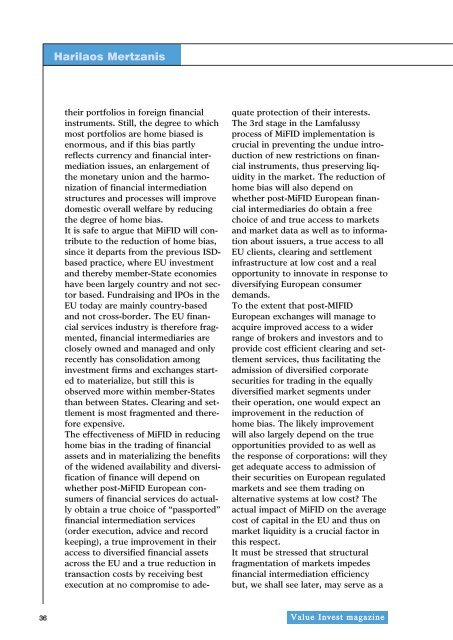VALUE INVEST - Valuation & Research Specialists
VALUE INVEST - Valuation & Research Specialists
VALUE INVEST - Valuation & Research Specialists
Create successful ePaper yourself
Turn your PDF publications into a flip-book with our unique Google optimized e-Paper software.
36<br />
Harilaos Mertzanis<br />
their portfolios in foreign financial<br />
instruments. Still, the degree to which<br />
most portfolios are home biased is<br />
enormous, and if this bias partly<br />
reflects currency and financial intermediation<br />
issues, an enlargement of<br />
the monetary union and the harmonization<br />
of financial intermediation<br />
structures and processes will improve<br />
domestic overall welfare by reducing<br />
the degree of home bias.<br />
It is safe to argue that MiFID will contribute<br />
to the reduction of home bias,<br />
since it departs from the previous ISDbased<br />
practice, where EU investment<br />
and thereby member-State economies<br />
have been largely country and not sector<br />
based. Fundraising and IPOs in the<br />
EU today are mainly country-based<br />
and not cross-border. The EU financial<br />
services industry is therefore fragmented,<br />
financial intermediaries are<br />
closely owned and managed and only<br />
recently has consolidation among<br />
investment firms and exchanges started<br />
to materialize, but still this is<br />
observed more within member-States<br />
than between States. Clearing and settlement<br />
is most fragmented and therefore<br />
expensive.<br />
The effectiveness of MiFID in reducing<br />
home bias in the trading of financial<br />
assets and in materializing the benefits<br />
of the widened availability and diversification<br />
of finance will depend on<br />
whether post-MiFID European consumers<br />
of financial services do actually<br />
obtain a true choice of “passported”<br />
financial intermediation services<br />
(order execution, advice and record<br />
keeping), a true improvement in their<br />
access to diversified financial assets<br />
across the EU and a true reduction in<br />
transaction costs by receiving best<br />
execution at no compromise to ade-<br />
quate protection of their interests.<br />
The 3rd stage in the Lamfalussy<br />
process of MiFID implementation is<br />
crucial in preventing the undue introduction<br />
of new restrictions on financial<br />
instruments, thus preserving liquidity<br />
in the market. The reduction of<br />
home bias will also depend on<br />
whether post-MiFID European financial<br />
intermediaries do obtain a free<br />
choice of and true access to markets<br />
and market data as well as to information<br />
about issuers, a true access to all<br />
EU clients, clearing and settlement<br />
infrastructure at low cost and a real<br />
opportunity to innovate in response to<br />
diversifying European consumer<br />
demands.<br />
To the extent that post-MIFID<br />
European exchanges will manage to<br />
acquire improved access to a wider<br />
range of brokers and investors and to<br />
provide cost efficient clearing and settlement<br />
services, thus facilitating the<br />
admission of diversified corporate<br />
securities for trading in the equally<br />
diversified market segments under<br />
their operation, one would expect an<br />
improvement in the reduction of<br />
home bias. The likely improvement<br />
will also largely depend on the true<br />
opportunities provided to as well as<br />
the response of corporations: will they<br />
get adequate access to admission of<br />
their securities on European regulated<br />
markets and see them trading on<br />
alternative systems at low cost? The<br />
actual impact of MiFID on the average<br />
cost of capital in the EU and thus on<br />
market liquidity is a crucial factor in<br />
this respect.<br />
It must be stressed that structural<br />
fragmentation of markets impedes<br />
financial intermediation efficiency<br />
but, we shall see later, may serve as a<br />
Value Invest magazine


